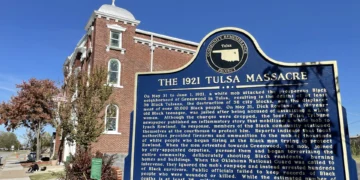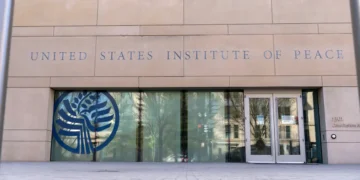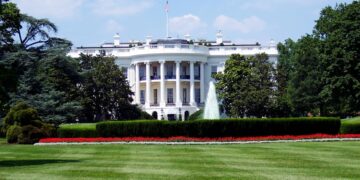Karen Freeman-Wilson, President and CEO of the Chicago Urban League, leads a discussion on “Family Sustaining Careers as a Wealth Building Tool” with panelists Andrew Wells, Vice President of Workforce Development at the Chicago Urban League; Marion Jones, Vice President of Workforce Development & DEI Engagement at Nexamp; and Robert McGhee, Senior Vice President and Community Impact Territory Manager for the North Region at Fifth Third Bank. Photo by Toure Muhammad. Img source: new.finalcall.com
May 30, 2024 Story by: Editor
CHICAGO — On May 17, the South Loop hosted an important gathering as leaders, activists, and community members came together for the Chicago Urban League’s “Policy Summit State of Black Chicago Solutions.” The summit aimed to address pressing issues and develop practical solutions to uplift Black Chicagoans.
The focus of the summit was on building wealth through homeownership and securing family-supporting careers. Executives from PNC Bank, Nexamp, and Fifth Third shared their initiatives to create more opportunities for Black Chicagoans and other underserved communities.
A key topic was the Chicago Urban League’s Appraisal Bias Task Force, which highlighted the urgent need to educate consumers about the home appraisal process and promote diversity and cultural proficiency in the real estate appraisal industry. These steps are crucial for breaking down barriers that impede Black wealth building through homeownership. These insights were shared with nearly 300 business professionals, civic leaders, and community members at the Marriott Marquis Chicago.
Themed “The State of Black Chicago: Solutions,” the policy summit addressed economic disparities highlighted in the Chicago Urban League’s 2023 State of Black Chicago report, released last June.
“We know from our 2023 report and previous reports that Chicago’s Black residents have the lowest household income, the highest levels of poverty and unemployment, and a far greater likelihood to be burdened by rent payments than the city’s other residents,” stated Karen Freeman-Wilson, President and CEO of the Chicago Urban League. “What’s important is to talk about solutions. How can we all work together to erase economic disparities?”
Black homeowners frequently find their properties significantly undervalued compared to others in the city—a disparity that has worsened over time. The report highlighted a stark increase in the racial gap in home values in the Chicago area, which rose from $50,000 in 1980 to a staggering $325,000 in 2020.
Racially biased home appraisals have garnered national attention in recent years, with numerous reports highlighting stark disparities in home valuations for Black homeowners compared to their White counterparts. Investigations in cities like Baltimore, where a Black couple saw their home value soar after they had a White friend stand in for them during an appraisal, and San Francisco, where a Black family experienced a similar situation, have underscored the pervasive nature of appraisal bias. Additionally, reports from Indianapolis and Jacksonville have revealed significant undervaluation of Black-owned properties, fueling widespread calls for systemic reform in the real estate appraisal industry.
The Chicago Urban League established the Appraisal Bias Task Force in response to these alarming statistics. Comprising appraisers, public officials, bankers, mortgage lenders, realtors, realtists (a licensed real estate agent who is a member of the National Association of Real Estate Brokers), researchers, and nonprofit professionals, the task force has been meeting since November 2023 to develop policy recommendations to tackle the undervaluation of Black-owned properties. Although the full report is expected by the end of 2024, six preliminary observations were shared during the summit:
- Appraisal bias is a symptom of the broader issue of homeownership for Black Chicagoans
- The root causes of racial disparities in homeownership—such as historic segregation and redlining—require complex analysis
- Addressing the racial disparity in homeownership necessitates a multi-industry approach
- Enhancing diversity and cultural proficiency in the appraisal industry would boost confidence in the appraisal process
- Many consumers do not understand the appraisal process, leading to assumptions of discrimination when mistakes may be the cause
- The process for appealing erroneous appraisals is challenging and could benefit from a more consumer-friendly approach driven by community and industry collaboration.
Pamela Stalling, Vice President of Housing & Financial Empowerment for the Chicago Urban League, emphasized the importance of the Urban League’s work. “We ensure every day that our clients are equipped to get the best financial practices to ensure their road to credit health, homeownership, business ownership, and overall financial success,” she said during a panel discussion with Lutalo McGee, Chair Real Estate Broker and owner of Ani Real Estate, and William Hendrix-Griffin, Senior Vice President of Affordable Lending at PNC Bank.
“We engage in this work against the backdrop of equity theft that has occurred through government-sanctioned redlining, land contracts, and other predatory practices,” Stalling added.
Tracey Scott, CEO of the Chicago Housing Authority, also stressed the importance of investment in disinvested communities. “We have to invest in our disinvested communities. We have to make that a priority. That’s the only way we will move forward, especially for Black families in Chicago.”
Though the speakers addressed many questions during the event, time constraints left some queries unanswered. In the coming weeks, the Chicago Urban League will host a Facebook and LinkedIn Live event to tackle these outstanding questions and delve deeper into potential solutions. Source: The Final CallEO of the Chicago Housing Authority, also stressed the importance of investment in disinvested communities. “We have to invest in our disinvested communities. We have to make that a priority. That’s the only way we will move forward, especially for Black families in Chicago.”
Though the speakers addressed many questions during the event, time constraints left some queries unanswered. In the coming weeks, the Chicago Urban League will host a Facebook and LinkedIn Live event to tackle these outstanding questions and delve deeper into potential solutions. Source: The Final Call















